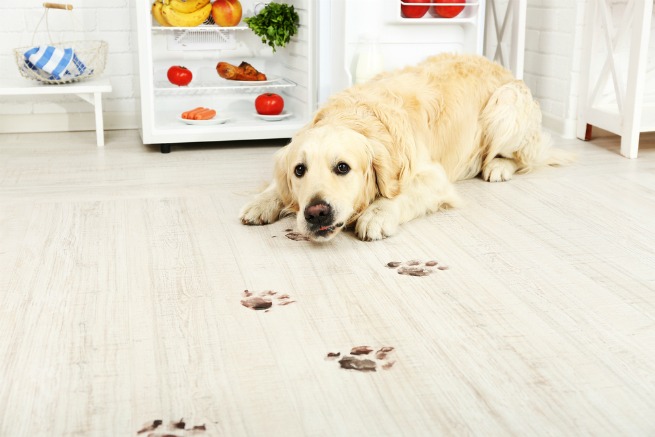Nobody relishes the thought of cleaning cat or dog urine from a hardwood floor, but every now and then our furry family members will have an accident that requires attention. So what’s the best way to remove pet urine on hardwood floors? Let us explain.
Step One - Absorb Liquid
Moisture is the enemy of hardwood floors, so the first step is to remove any debris and absorb the liquid as quickly as possible. Blotting it up with kitchen roll or another disposable paper towel product is preferable to cloths which will harbour the bacteria and start to smell.
Step Two - Disinfect
Disinfecting the area is crucial for killing harmful germs, especially important if you have small children in the home. Aside from killing the germs, the disinfectant will also prevent infections and sanitise the environment making the area safe to touch again. It will also help get rid of any odour. You can try treating the stain with a commercial disinfectant cleaner (read the label to check it’s suitable for hardwood floors). We’d suggest trying on a small patch first to check it reacts OK with your hardwood flooring.
Step Three - Dry
Once your floor is disinfected make sure that you dry the area thoroughly. We recommend using clean towels, dehumidifiers and circulated air from fans or open windows.
What if the Pet Urine has Soaked into the Floor?
If the urine has sat on the surface of your hardwood floor for a while, the wood is more likely to have absorbed some. That being the case, it may be necessary to take a more aggressive approach to removing both the visible stain and the smell from deeper in the fibres of the wood.
Use of Wood Bleach
Using a diluted wood bleach such as oxalic acid can be a good solution, so long as you are cautious in the ratio of bleach to water. Then again, as moisture is the enemy of hardwood floors, the advice is to paint the solution onto the area sparingly, before wiping it over a few times with a baking soda mix to neutralise the bleach.
Once the wood is clean and dry, a little wax may then help to restore your floor to its former glory.
Sanding and Refinishing
In the most severe cases, where cat or dog urine has permeated hardwood floors, sanding the area back may be the only way to remove the worst affected wood fibres before refinishing. This is the worst case scenario and not one to be undertaken lightly, but can provide the best results.
This process is more common in the renovation of neglected properties where there may have been extended periods of neglect and poor pet behaviour, or where there are hardwood floors in bathrooms and the animals are not to blame!
Why is it Important to Ensure the Odour of Pet Urine is Removed?
The smell of pet urine can make your living environment very unpleasant. Even when the affected area has been cleaned to the point where it's no longer detectable to humans, your pet may still be able to smell it. But why is that important?
Scent Markers
Animals have a highly developed sense of smell as a natural instinct. Dogs and male cats may mark their territory, particularly if not spayed or neutered. They may also take the residual scent as a cue that it’s ok or even right to use that spot as their toilet.
How Can I Stop Them Doing It Again?
There are a number of actions that you can take to deter your pet from using your hardwood floor as a toilet.
Use a Pet Urine Specific Cleaner
Cleaning soiled areas so that they smell ok to you isn’t enough. It is worth purchasing a specific bottle of pet urine cleaner. These products contain chemicals specifically designed to eliminate the odour of pet urine. While it’s not ideal to use chemicals on your hardwood floor (test in a small inconspicuous area first), it's preferable to a repeat performance of the offence.
Obstruct or Redirect
To prevent your pet from returning to the area, you could either make that area inaccessible or redirect their attention for its purpose. If your pet eats or plays in that area, a new association is made and the behaviour should stop.
Resolve the Trigger
If your pet urinated on your hardwood floor because it was triggered by something, resolve the trigger. If that’s an object, such as a guest's belongings or new purchases with ‘strange’ smells, then keep them away from your pet. If it’s a new living companion, human or furry, then work to build a more harmonious relationship. Reinforce it by being generous with treats.
Be Prepared
In addition to arming yourself with the products mentioned in this article, it may be worth having a bottle of our intensive cleaner spray in hand. The WOCA intensive cleaner spray is designed to protect and nourish your hardwood floors against the spills and thrills of everyday life. We certainly recommend it both as part of your general floor care routine and to help with the removal of cat and dog urine on hardwood floors.
We’re always happy to offer help and advice, so If you are unsure about how to clean pet urine from your hardwood floor, please call 030 100 00 15 to speak to one of our flooring experts.
